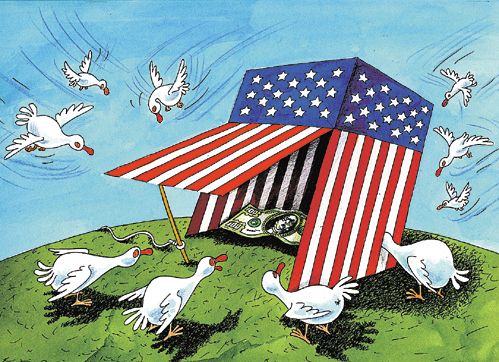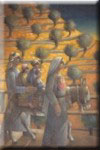Five years ago, I ran the cultural section at Komsomolskaya
Pravda. Publishing houses used to send me their new releases now and again for
review. One day, after digging through the latest shipment of such literature, I
stumbled upon a book titled, "Sunset of the Dollar
Empire and the End of the
Pax Americana."
I remember reading the title over to myself several times in disbelief. Way
back when, Soviet Americanologists loved to debate the collapse of the U.S.
financial empire. But this book was published in 2003.
I flipped through the pages, skimming over the text. The conclusions of the
author — an economist named Mikhail Khazin — seemed convincing enough. So I gave
the book to our economics columnist at KP Jenya Anisimov, who wrote a review and
interviewed the author later at our editorial offices.
All these years, I kept Khazin in the back of my mind, and followed his
career as he spoke at various conferences throughout Russia. He seemed certain
the U.S. was teetering on the verge of an economic collapse, while other
analysts were quick to refute his theory. Now, as his once unfathomable
prognosis begins to come true, KP contacted Khazin for an interview.
Fired from the Kremlin!
KP: Mikhail Leonidovich, how did you end up predicting the current
financial crisis?
Khazin: In the spring of 1997, the Kremlin established the
Presidential Economic Department. I was made the deputy head of the unit. Our
first task was to prepare a report for [former
President Boris] Yeltsin about the economic situation. We
realized an economic crisis was pending in Russia and would take place in the
late summer or early fall of 1998 if the country''s economic policies weren't
changed.
KP: What view did the higher echelons take of your report?
Khazin: They didn't really take any view at all. No one read
the text except for the deputy head of the administration and Yeltsin himself.
In the summer of 1998, we were fired from the presidential administration for
trying to stop a business project titled, "State Treasury Bills— Exchange Rate
Corridor." This was the biggest financial scheme of the post-Soviet era. Just as
we had predicted, an economic crisis gave way that
August. Together with my colleagues, I continued researching
the reasons behind the crisis.
After becoming seriously consumed in our studies of the U.S. financial
system, we found an unprecedented parallel. Just as our T-bill market had sucked
all the juices out of the Russian economy, the U.S. financial market was sucking
the resources out of the entire planet. We realized a similar fate awaited the
U.S. financial system. Our article was published in the summer of 2000 in the
"Ekspert" magazine, titled, "Is the U.S. Digging for an Apocalypse." We
concluded that it was just as impossible to avoid an economic crisis in the U.S.
as the financial collapse in Russia.
Playing the idiot
KP: The U.S. obviously didn't listen to the song written by [the
renowned Russian rock group] LUBE during perestroika, "Don't Play the Fool,
America!" Seriously, though, what's the real reason for the economic collapse?
Let's try to do this without any heavy duty financial terms...
Khazin: I'll try! The economic model that led to the
collapse was the result of a crisis in the 1970s. This was a terrible financial
crisis that was the result of surplus capital. Even the 19th-Century classics in
economics literature concluded that capital grows faster than labor provides
compensation. As a result, there is a lack of demand. In traditional
capitalism, this problem is solved on account of crises in excess production.
And in an imperialistic system, the problem is solved on account of capital
outflow. But by the 1970s, these solutions had run their course. However, the
internatinoal situation demanded the U.S. either make a great scientific and
technological leap forward or lose the Cold War to the USSR. The administration
of [
President Jimmy] Carter and the head of the Financial Reserve
System Paul Walker developed a very tricky concept. For the first time in the
history of capitalism, capitalists began helping others, issuing new currency in
an effort to stimulate aggregate demand .
KP: They decided to switch on the printing press?
Khazin: Exactly. In the early 1980s, they started to stimulate demand
through state support. For example, they launched the "Star Wars" program. As of
1983, they placed an emphasis on the household economies.
KP: You mean, they relied on the average citizens?
Khazin:
Yes. For an entire quarter century, households received funds
as a result of issuing new currency in larger and larger quantities.
KP: In other words, credit?
Khazin:
Yes. The U.S. was able to make the next step in technological
progress as a result of this excess demand. They accomplished the collapse of
the USSR and numerous other significant fears. But... The boom took place thanks
to resources that were supposed to provide for future growth. The country ate
its own resources two generations ahead of time. The U.S. built up tremendous
debt. This is clearly seen if we compare the growth of debt in U.S. households
with the entire U.S. debt and GDP. The economy is growing at an annual rate of
2-3, or at a maximum 4 percent. But debt is increasing at a rate of 8-10
percent.
 |
| Illustration by Valentin
Druzhinin. | |
KP: Well, let the debt keep growing... The U.S. lived fine up until now
without a problem... Better than we did!
Khazin: Yes, the U.S. did create a very high standard of living by
stimulating consumer demand. Generations lived without having to experience
poverty. But it's impossible to live forever in debt. Household debt has now
surpassed the national economy — more than $14 trillion. Now it's time to pay
up. Of course, Wall Street tried to postpone this collapse. I won't go into
detail about derivatives and other such financial assets, but this was just a
gasp for air before an inevitable death.
Another problem in the U.S. is that powerful industries were built around
this growing demand. Whatever decision Wall Street takes right now, the demand
is going to fall. What will happen to these industries? In 2000, we estimated
that 25 percent of the U.S. economy would disappear. Today, we think the number
is closest to one-third — if not more.
KP: That's a lot!
Khazin: That's an incredible amount! But what exactly does this mean — the
destruction of one-fourth of the U.S. economy? It means an uncontrollable
increase in unemployment, a horrible depression, a sharp increase in the effect
of social services on the budget... Now, the U.S. is jumping all over the place
doing everything its can to rescue this fraction of the economy. The government
is stimulating banks and manufacturing. .. But regardless, in 2-3 years, the U.S.
will face a crisis similar to the Great Depression.
Who is Who
Mikhail Leonidovich Khazin was born in 1962. He studied mathematics at the
Yaroslavl University and Moscow State University. In 1984-1991, he worked at the
Soviet Academy of Sciences. In 1993-1994, he worked at the State Working Center
of Economic Reforms. In 1995-1997, he was the head of the Credit Policy
Department at the Economics Ministry. In 1997-1998, he was the deputy head of
the Presidential Economics Department. In June 1998, he left state service. At
the moment, he is president of the consulting firm, Neokon.

























